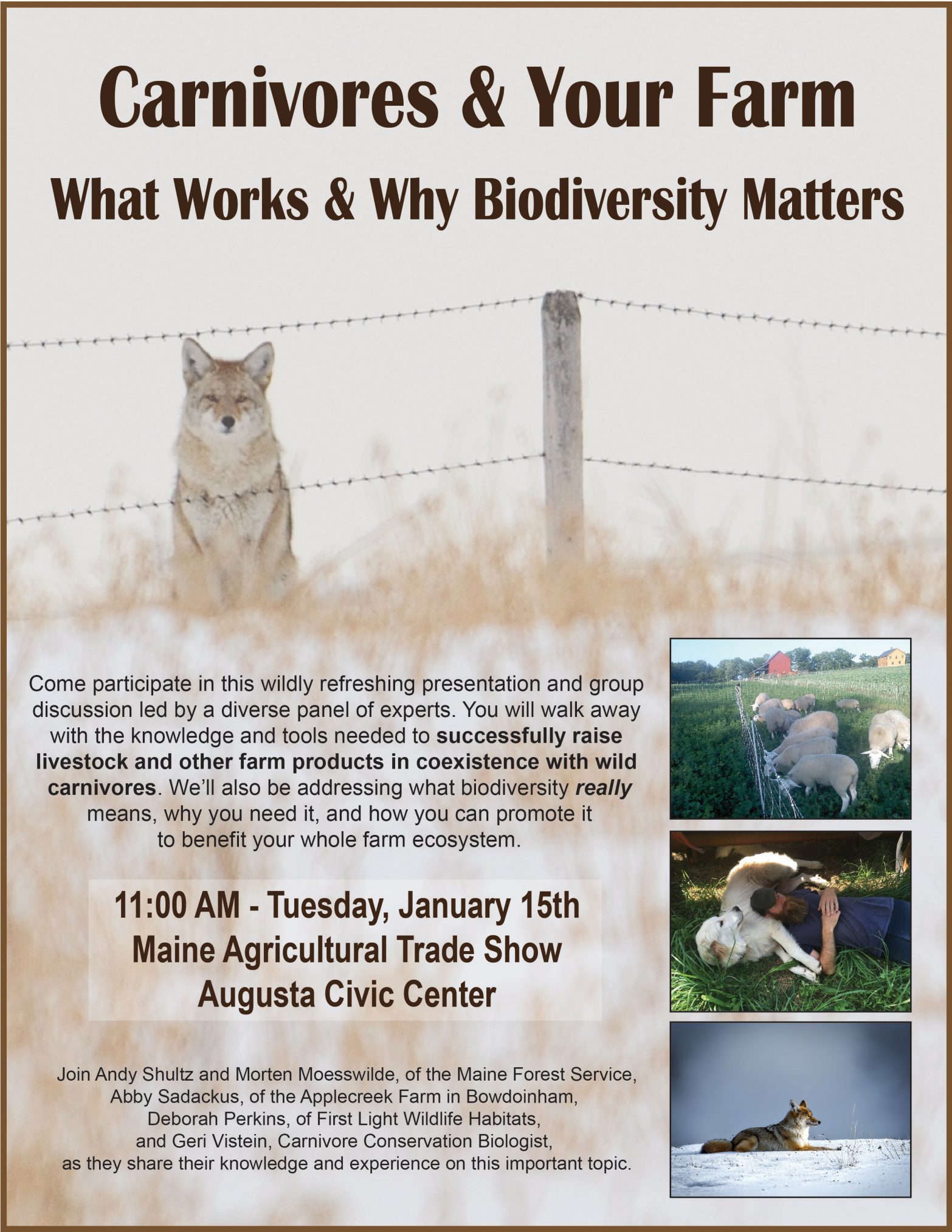
This is how a COLLABORATIVE EFFORT can be a great support to our farmers seeking to farm in peace with the carnivores with whom they share their land. We are so excited to be presenting this presentation together. We encourage you to do the same.

This is how a COLLABORATIVE EFFORT can be a great support to our farmers seeking to farm in peace with the carnivores with whom they share their land. We are so excited to be presenting this presentation together. We encourage you to do the same.
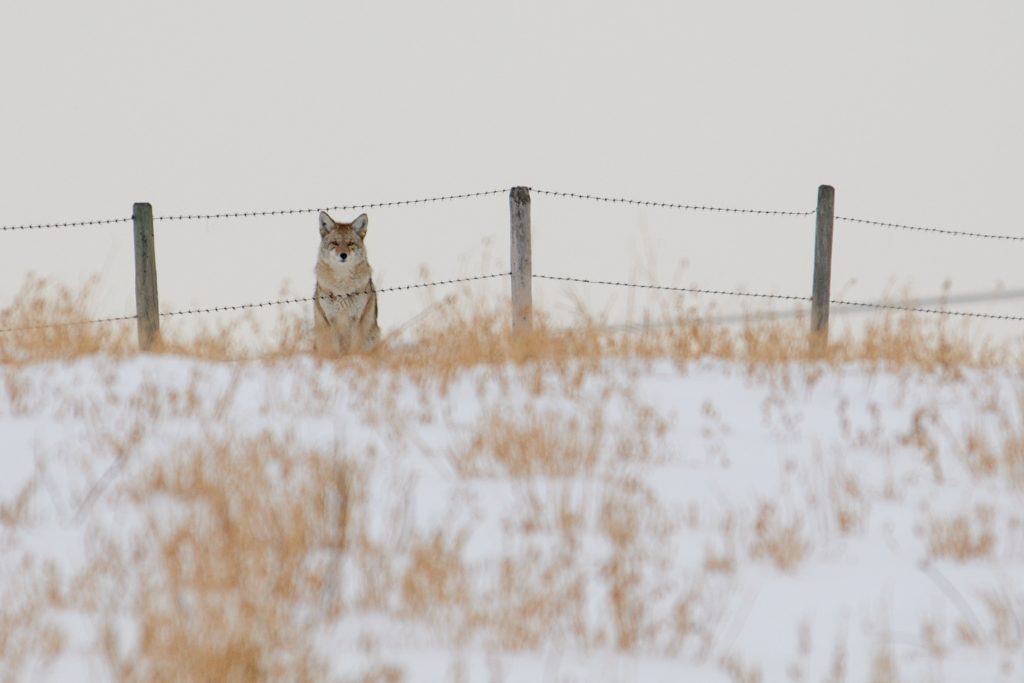
SHARING AN EXCITING COLLABORATIVE EVENT
Sponsored by Knox-Lincoln Soil & Water Conservation District, Maine Coast Heritage Trust and Midcoast Farmers Alliance.
Whole Farm Biodiversity: Co-existing with Carnivores ~
An ecosystem is defined as “a biological community of interacting organisms and their physical environment,” yet the term is rarely used to describe a farm! A farm is indeed an ecosystem and one of the key elements in any healthy ecological system is a healthy predator-prey balance. However, carnivores are often viewed as a problem for livestock farmers and their role in herbivore control may be underappreciated by veggie growers.
On Saturday, September 29 from 1-4pm at Pumpkin Vine Family Farm in Somerville, join farmers, foresters and wildlife professionals to gain critical insights into how your farm functions as an ecosystem and how you can actively promote biodiversity to keep that ecosystem healthy and productive.
Presenters Andy Schultz and Morten Moesswilde, Maine Forest Service; Deborah Perkins, wildlife ecologist; Geri Vistein, carnivore biologist; and Pumpkin Vine farmers Kelly and Anil Roopchand will each explore this subject from their own professional background and experience. Following the presentations, Kelly and Anil will lead a tour to demonstrate how they are putting these principles into practice.
This free program is the seventh in the 2018 Farmer & Gardener Workshop Series presented by Knox-Lincoln Soil & Water Conservation District, Maine Coast Heritage Trust and Midcoast Farmers Alliance. Pumpkin Vine Family Farm is located at 217 Hewett Rd in Somerville, ME. From Rt 17, turn north on Hewitt Rd (Jones Corner). The farm is at the end of Hewitt Rd (about one mile).
For more information or to register: www.knox-lincoln.org/beginning-farmer, hildy@knox-lincoln.org or 596-2040.
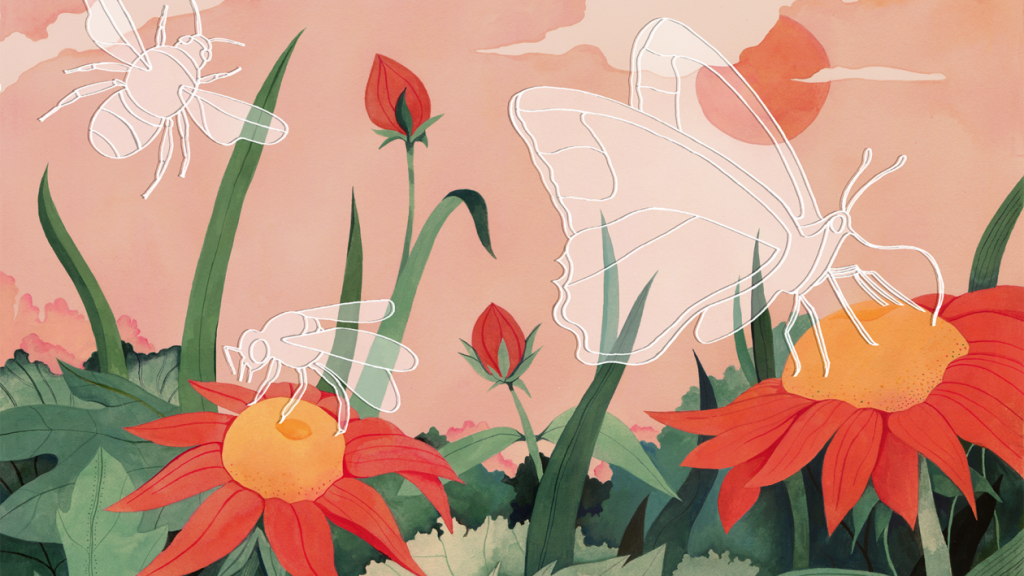
YOUR FARM IS AN ECOSYSTEM ~ ITS NEEDS TO HAVE ALL THE PLAYERS PRESENT
Insects play a vital role on our planet ~ they are the essential pollinators, and without them there would be no plant life on our planet. They are also the essential prey….. the food for birds that require them to feed protein to their growing young. Without them there is nest failure….
BUT INSECT NUMBERS ARE DECLINING SIGNIFICANTLY WORLD WIDE.
And why ……. by the widespread use of poisons and habitat loss for them.
This is why it is so important for you to see your farm as an ECOSYSTEM. When you treat it as such, poisons are out of the question, and your land becomes a diverse habitat that supports all the members of that system.
See the link below that details this significant situation: https://e360.yale.edu/features/insect_numbers_declining_why_it_matters
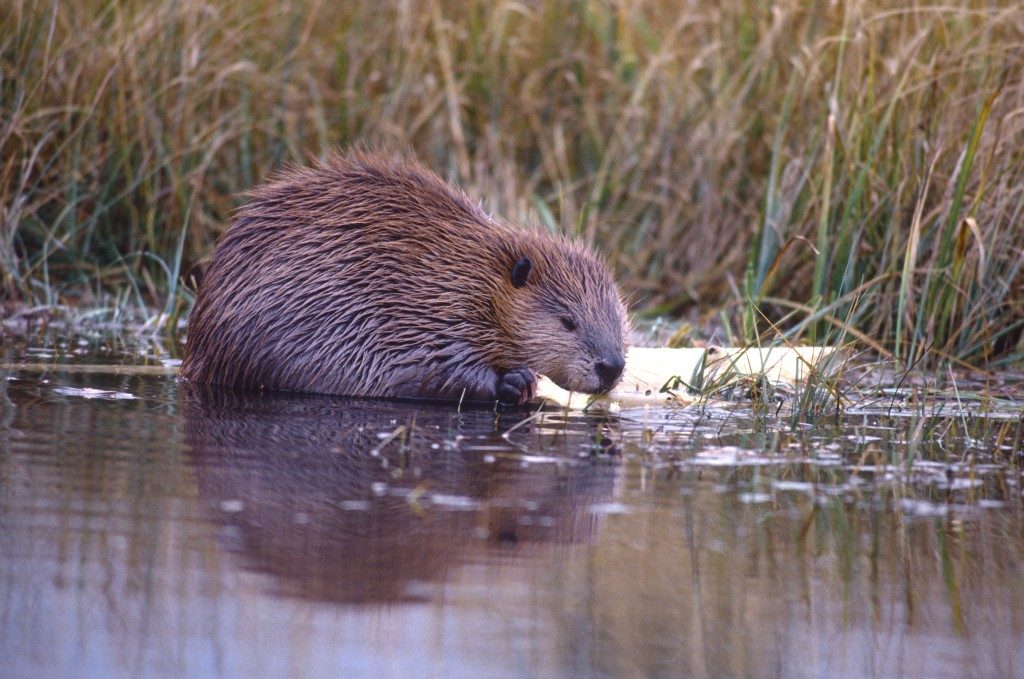
THOUGH BEAVERS ARE NOT CARNIVORES…THEY ARE KEYSTONES. SO APPRECIATING THEIR ROLE IN THE ECOSYSTEM OF YOUR FARM GIVES YOU A DEEPER UNDERSTANDING OF THE COMPLEXITY OF A HEALTHY, DYNAMIC LANDSCAPE THAT SUPPORTS YOUR EFFORTS IN SUCCESSFUL FARMING.
Here is an engaging article you may find enlightening ~ https://phys.org/news/2018-05-beavers-good-reveals.html
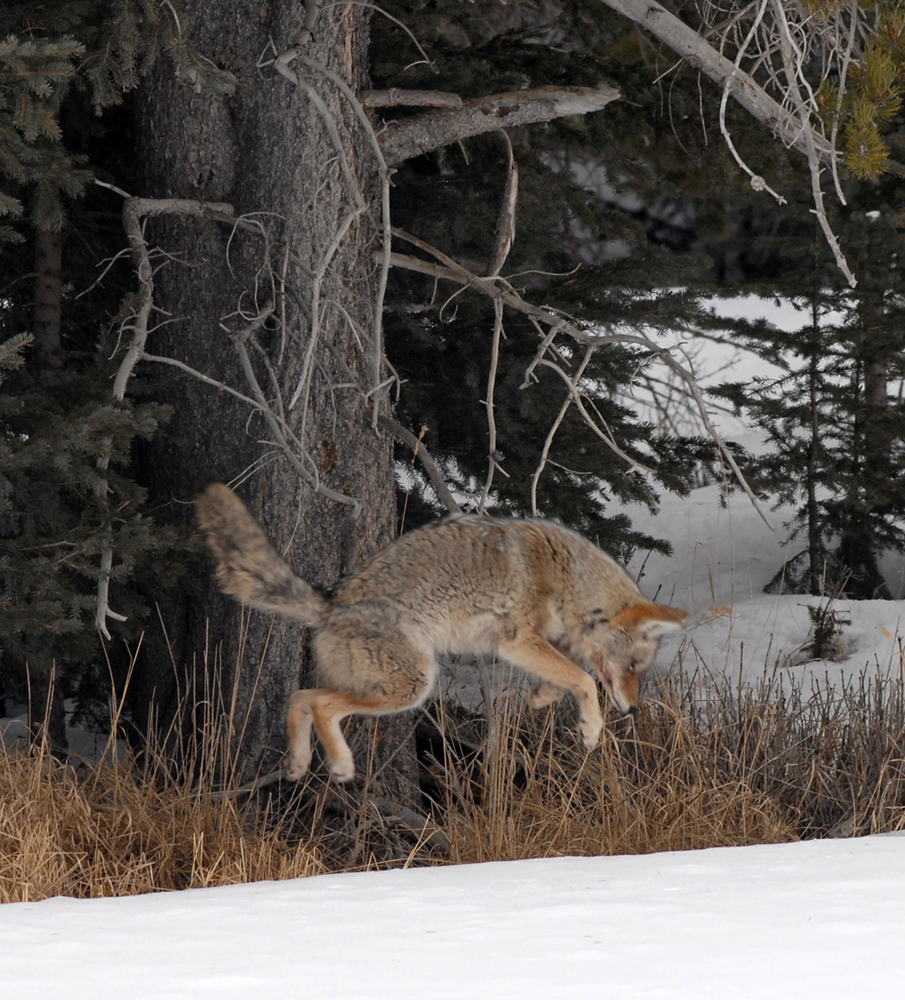
LYME DISEASE IS AN EPIDEMIC IN THE UNTIED STATES
And our farmers and their farm animals are increasingly being exposed to it. ENTER CARNIVORES! Carnivores like Coyotes especially, and foxes offer you the service of rodent patrol. And rodents (white footed mice) are the carriers of the Lyme disease bacterium and other life threatening bacterium. Below is a link regarding the serious need to treat your farm as an ecosystem that needs all it parts.
ALSO… THE OPOSSUM! You may not think they are cute, but they do serious work in tick control. They groom themselves fastidiously, like cats. If they find a tick, they lick it off and swallow it. In one season, a opossum can kill 5,000 ticks. They literally vacuum the landscape as they move along.
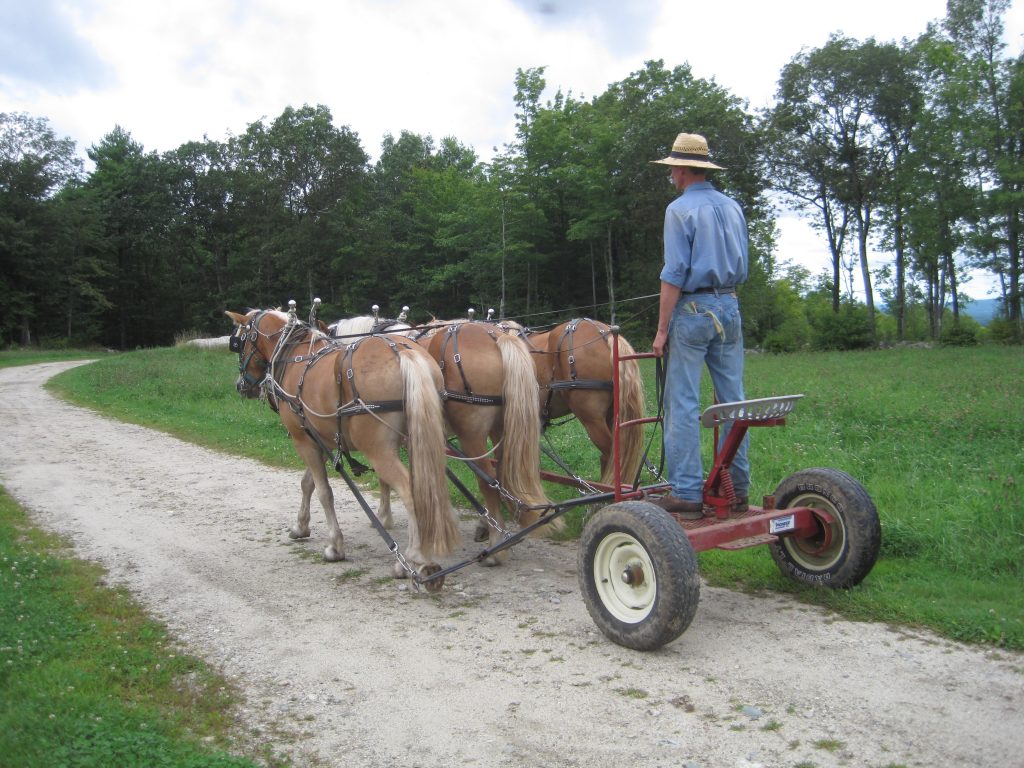
OUR FARMS ARE ECOSYSTEMS NOT ISOLATED PATCHES OF LAND
WHEN YOUR FARM SUPPORTS HEALTHY BIODIVERSITY OF LIFE, YOUR FARM IS HEALTHIER AND MORE SUCCESSFUL
The following link speaks of special areas of your farm that support ecosystem health: https://phys.org/news/2013-05-unkempt-weedy-unintentionally-boosts-wildlife.html

What do forests have to do with the success of your farm? Actually ….a great deal!
The forests on your farm play an important role in keeping your farm healthy and protecting life on your farm from disease. First of all, the forests are refuges for the carnivores, who are important in balancing their prey populations, (herbivores) who can have a serious affect on the landscape if their populations are not balanced.
These herbivores can also diminish the homes of important bird species that control insects on your farm.
So we encourage you to pick up this wonderful book pictured above. it will open a whole new world to you, and you will never look at your forest in the same way.
And speaking of important birds whose homes the predators keep available to them ~ the following is a delightful link that speaks about what your wintering birds – namely our chickadees and nuthatches – do to keep your trees healthy and insects in check. (Though they are referring to the trees in the West, it all holds true for our trees in the east)
The tiny friends of a forest giant
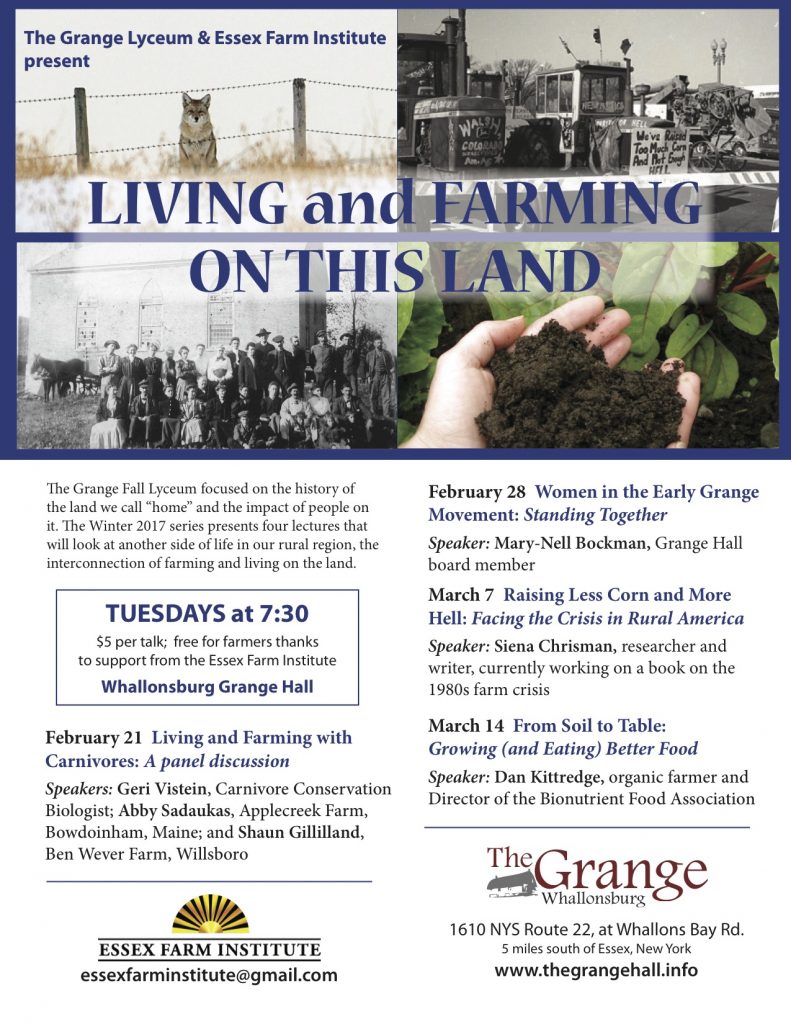
WE ARE EXCITED TO ANNOUNCE AN OPPORTUNITY FOR FARMERS AND THE COMMUNITY TO COME TOGETHER AND LEARN ABOUT AND SHARE EXPERIENCES REGARDING CARNIVORES
AND THEIR ROLES ON OUR FARMS.
COME JOINS US!
If you are not able to come, organize such a gathering where you live
The following is a short description of our gathering ~
Farms are not isolated parcels but are part of an entire community. Carnivores play an important role in the Earth’s ecosystems; systems that agriculture thrives in. This lyceum will be a panel discussion with Geri Vistein, a Carnivore Conservation Biologist who will take us into the lives of the carnivores living in the North Country, describing their sociology, hunting habits and life cycles. Abby Sadauckas, whose family owns the Applecreek Farm in Bowdoinham, Maine, and is a member of the Farming with Carnivores Network, will share her farm’s understanding of the carnivores around them, and what they do to live together with them. Shaun and Linda Gilliland are local livestock farmers who use a combination of tools to protect against predators. They will discuss their experiences farming with carnivores over the years.
How many of you have read the new book Half the Earth by renowned ecologist E.O. Wilson. He has written that we humans need to be thinking about saving half the Earth for all the other living beings with whom we share our planet.
What about your farm? You need not save half, but maybe think more of it being an ecosystem, and how healthy you want it to be. Here is a link from a farm in Florida who have decided on saving parts of their farm as “non-human zones.” They wanted to share it with you.
When you read their blog post, note a short comment when referring to predators ~ Note that they write “The draw back?” note the question mark. You can almost feel how they have moved through the presence of predators by themselves …as you read on. Here is the link: http://floridahomesteading.com/non-human-zones/